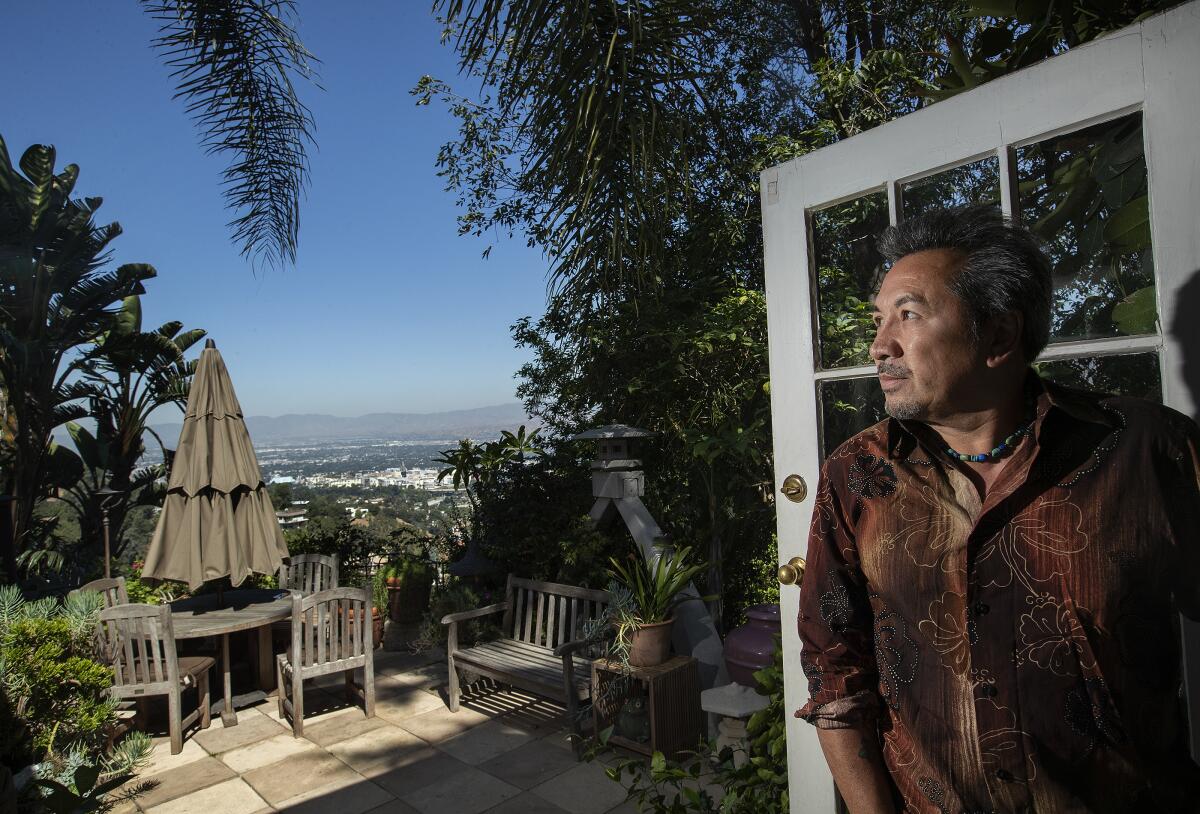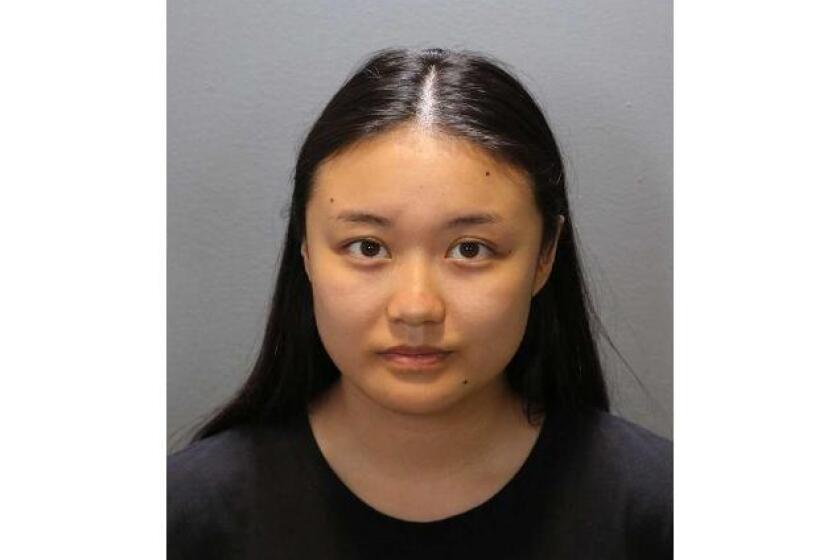L.A. hosts fear crackdown on renting out second homes for short stays

P.J. Lennon had a plan for his retirement: To pay his bills, he would rent out the one-bedroom house that sits alongside his home in the Hollywood Hills.
He fixed it up with Buddha sculptures and artwork and began advertising it online through Airbnb and VRBO. Travelers paid up to $199 a night to sleep in the hideaway with banana trees and a show-stopping view.
He was banking on that money to pay the bills, he said, after a career as an actor, model and photographer. When he dies, Lennon said, “I just want to be carried out of my own home in a pine box.”
But he fears he may not be able to remain there under an ordinance that says Angelenos can rent out only their “primary residence” for short stays, not a second home or investment property. Lennon said those rules would eliminate his only source of income, likely forcing him to sell his house and move.
“I don’t want to be forced out by the government,” he said.
Tenant activists and other critics of short-term rentals argue the rules will help prevent apartment buildings from being bought up and run like hotels, pulling units off the market in the middle of a housing crisis. The Los Angeles City Council approved the rules in December after more than three years of debate over how to regulate night-to-night rentals.
But hosts like Lennon who rent out something other than their primary residence — a phenomenon the city has dubbed “vacation rentals” — have argued that an outright ban goes too far. As the city prepares to start enforcing the law in November, some are pleading with the city to rethink its plans.
A newly formed group called Homeshare Alliance Los Angeles has been pushing council members to permit some Angelenos to rent out a secondary unit to travelers. They argue that the city has unfairly lumped them in with “commercial operators” advertising dozens of units.
“They’re throwing the baby out with the bathwater,” said Chani Krich, one of the leaders of the alliance. “We support getting rid of commercial operators. ... But thousands of mom-and-pops need to be protected.”
Tenant advocates have resisted that push, citing the dire need for housing.
“You’re pulling a unit off the market,” said Cynthia Strathmann, executive director of the nonprofit Strategic Actions for a Just Economy. “We’re allowing all this housing to funnel off the market so a few people can make money?”
City officials have estimated there are between 8,000 and 13,000 listings for “vacation rentals” in L.A. When the new law allowing people to rent out their primary residence for short stays was approved, several council members proposed a second ordinance that would permit people to do so with other properties as well. In February, city staffers tossed out a number of options, including capping the number of vacation rentals for each host.
“I assumed they were going to have everything in place by the time they started enforcing everything,” said Marta Cross, who lives in a Highland Park duplex and rents out the second unit for short stays.
But nothing has been drafted — and some council members don’t think it should be. Councilman Mike Bonin, who represents coastal areas including Venice, called permitting vacation rentals “nothing short of a full-frontal assault” on the rental rules and argued that doing so could fatally complicate the enforcement system before it had a chance to work.
Bonin added that if mom-and-pop operators are relying on income from a second unit, “it would be great if those units were being rented by people who live permanently in Los Angeles” as tenants.
As L.A. faces a housing crisis, “every second unit is a unit that could be made available for housing and should be made available for housing,” said James Elmendorf, policy director for the Los Angeles Alliance for a New Economy, which advocated limiting short-term rentals.
Many hosts say that they can’t or won’t do that. Some rental operators say they need to be able to use a second unit from time to time to put up family or other visitors, making it impossible to bring in a longtime tenant. Others say it just won’t bring in enough money to cover their bills.
Lennon said he had rented his property to tenants before, only to end up with scofflaws who stopped paying the rent. When he went to court to eject them, “I lost what little savings I had,” he said.
In Eagle Rock, Peter Hwang bought a triplex and is living with his family in one unit, renting another to a longtime tenant, and advertising the third for short stays.
Hwang said that if he couldn’t rent out that third unit to travelers, there would be no way he could afford to keep renting to his tenant — an elderly woman whose rent he hasn’t raised.
Renting out both units to long-term tenants would mean “hemorrhaging money every month,” he said. If the city starts enforcing the rules, Hwang said he would have to consider selling the triplex.
Cross said that with her second child due in November, she is trying to get rid of the furniture in her second unit in Highland Park and find a tenant.
The higher rates she can get from short-term rentals — between $100 and $140 a night — have helped cushion the irregular income she and her husband bring in as an actress and jazz musician, she said.
“It’s going to be OK for a few months,” Cross said. “But I worry about the month after that.”
Hosts have also raised concerns about soon-to-be enforced restrictions on hosting such rentals in “granny flats” or accessory units, as well as a blanket ban on units that fall under the Rent Stabilization Ordinance, which limits rent hikes. Krich said that if those rules are not changed, she would likely have to sell her property and delay starting a family.
Online platforms like Airbnb and VRBO have urged the city to hold off on enforcing the rules. VRBO representatives have argued that L.A. should wait and continue to work on “holistic” rules that regulate night-to-night rentals in all kinds of properties, including “traditional vacation rentals.”
Homeshare Alliance Los Angeles, the recently formed group for hosts, has suggested allowing people to rent out two units — their primary residence and a second unit — on L.A. parcels with four units or fewer. It also wants people living in rent stabilized units to be allowed to offer up their own primary homes for short stays.
The push to delay enforcement and revisit the rental rules has worried tenant activists and other critics of Airbnb-type rentals. A coalition of tenant advocates, community groups and the hotel industry has urged city leaders to start enforcing the restrictions in November to “stop the bleeding of our housing stock.”
“If the city wants to strategically focus their enforcement resources on ... corporate owned and operated short-term rentals, I don’t think you’re going to hear us complain,” said Bill Przylucki, executive director of the community organizing group People Organized for Westside Renewal.
But “this is the law,” he said. “There are elections in 2020 if you’re really that upset about it.”
More to Read
Start your day right
Sign up for Essential California for news, features and recommendations from the L.A. Times and beyond in your inbox six days a week.
You may occasionally receive promotional content from the Los Angeles Times.







